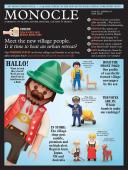
Issue 93
Meet the new village people. Is it time to beat an urban retreat? Our premiere survey on the best villages and hamlets to set up shop, office and goat hutch (and all the little folk you’ll need in your life)
In This Issue
Oops! No content was found.
Looks like we no longer have content for the page you're on. Perhaps try a search?
Return Home

